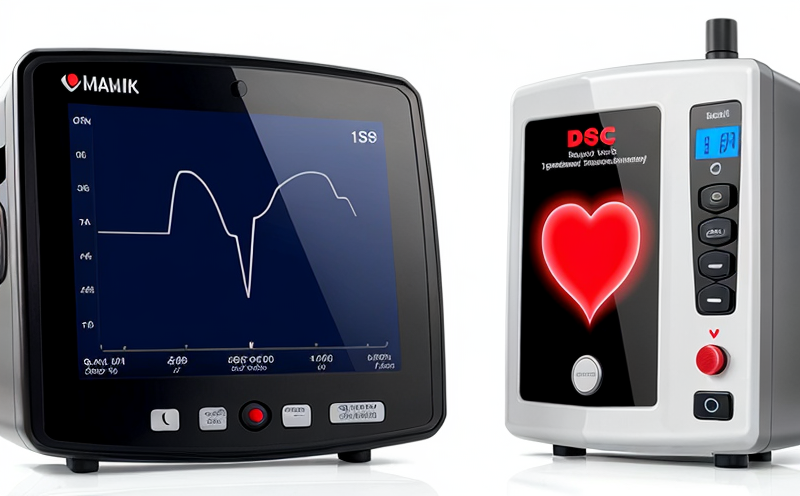ISO 14708 4 Implantable Defibrillator Device Testing Validation Method Development Test
The ISO 14708-4 standard is a critical component of the International Organization for Standardization (ISO) framework dedicated to ensuring safety and performance in medical devices, including implantable defibrillators. This particular section focuses on the validation method development test, which ensures that the device functions reliably under specified conditions.
The process involves several stages: initial design review, prototype testing, iterative refinement, and final validation. Each stage is crucial for ensuring that the implantable defibrillator meets stringent safety criteria set forth by ISO 14708-4. Compliance with these standards not only guarantees patient safety but also ensures regulatory compliance, which is essential in the highly regulated medical device industry.
The testing protocol outlined in this standard includes a series of rigorous tests designed to simulate real-world conditions that an implantable defibrillator might encounter during its operational lifecycle. These tests are conducted using specialized equipment and procedures that mimic physiological environments as closely as possible. The goal is to identify any potential flaws or weaknesses in the design, materials, or manufacturing process before the device reaches market.
The testing procedure typically begins with a comprehensive review of the design specifications provided by the manufacturer. This involves examining all aspects of the defibrillator's construction, including its electrical components, mechanical parts, and software algorithms. Following this initial assessment, prototypes are manufactured and subjected to various tests aimed at evaluating their durability, reliability, and overall performance.
One key aspect of ISO 14708-4 compliance is the use of appropriate test methods tailored specifically for implantable defibrillators. These methods often involve advanced simulation techniques that can replicate complex biological interactions within the human body. For instance, testing may include exposure to high voltage discharges similar to those encountered during actual cardiac arrhythmia events. Additionally, mechanical stress tests are conducted to ensure that the device remains intact and functional under conditions of physical strain.
Another important element is the validation process itself. Once prototypes have been thoroughly tested, feedback from these evaluations is used to make necessary adjustments to the design or manufacturing processes. This iterative approach ensures continuous improvement throughout the development cycle. After multiple rounds of testing and refinement, a final version undergoes rigorous validation tests before being deemed compliant with ISO 14708-4 standards.
It's worth noting that compliance with ISO 14708-4 goes beyond mere adherence to technical specifications; it encompasses broader principles of quality assurance and risk management. By implementing strict quality control measures at every stage of production, manufacturers can minimize risks associated with potential failures in the field. This proactive stance helps protect both patients and healthcare providers by fostering trust in the reliability and effectiveness of implantable defibrillators.
The implementation of ISO 14708-4 also contributes significantly to advancements within the medical device industry. As standards evolve, so too do technologies used for testing purposes. Continuous innovation ensures that future generations of implantable defibrillators will continue meeting increasingly stringent requirements while maintaining high levels of safety and efficacy.
In conclusion, ISO 14708-4 represents a vital step towards ensuring the safe deployment of implantable defibrillators into clinical practice. Through rigorous testing protocols and adherence to established guidelines, this standard plays an essential role in safeguarding patient health while promoting technological progress within the medical device sector.
Eurolab Advantages
- Our team of experienced professionals brings deep expertise in medical device testing, ensuring accurate and reliable results.
- We utilize state-of-the-art equipment and facilities to conduct comprehensive evaluations according to international standards.
- Dedicated resources allow us to handle large volumes of projects efficiently without compromising quality.
- Our collaborative approach fosters close relationships with clients, providing personalized support tailored to individual needs.
Competitive Advantage and Market Impact
EuroLab's commitment to excellence in ISO 14708-4 compliance places us at the forefront of the industry. Our rigorous testing methodologies not only ensure that our clients meet regulatory requirements but also exceed them, setting a new benchmark for quality.
- By consistently delivering accurate and repeatable test results, we enhance confidence among stakeholders in medical device reliability.
- The ability to provide rapid turnaround times without sacrificing accuracy gives us an edge over competitors who may struggle with balancing speed and precision.
- EuroLab's extensive network of partners and collaborators allows us to stay ahead of emerging trends and incorporate innovative solutions into our services.
Use Cases and Application Examples
The ISO 14708-4 standard is applicable across various stages of a medical device's lifecycle, from research and development through manufacturing to post-market surveillance. Here are some specific scenarios where this particular section comes into play:
- Prototype evaluation: Before committing resources to full-scale production, manufacturers often require assurance that their initial designs will function correctly.
- Design modification iterations: Based on feedback from early tests, adjustments can be made iteratively until the optimal balance between performance and safety is achieved.
- Pilot production validation: After completing design modifications, a small batch of devices undergoes final validation before full-scale manufacturing begins.





